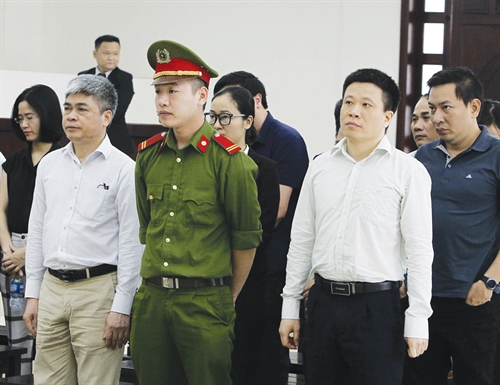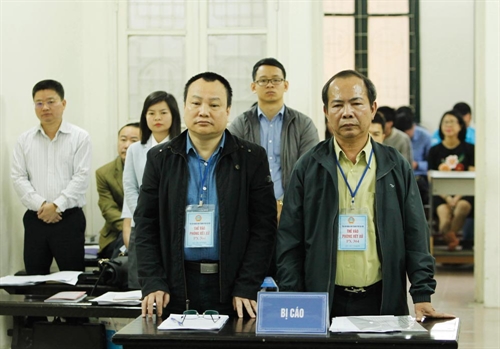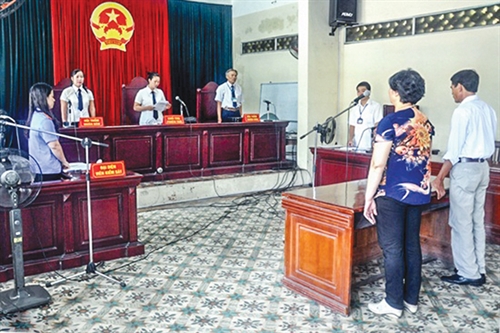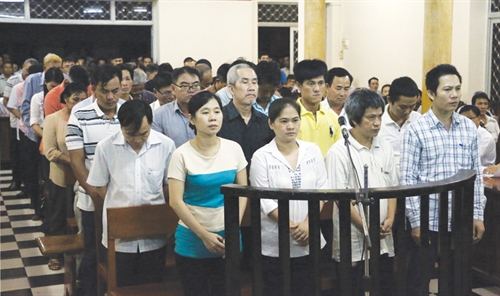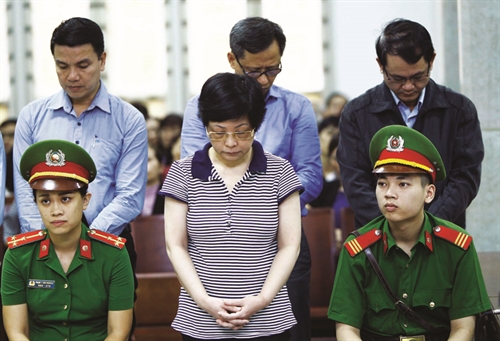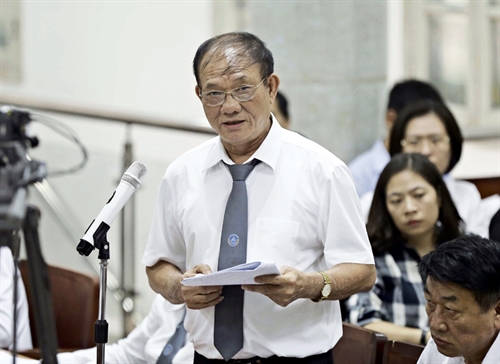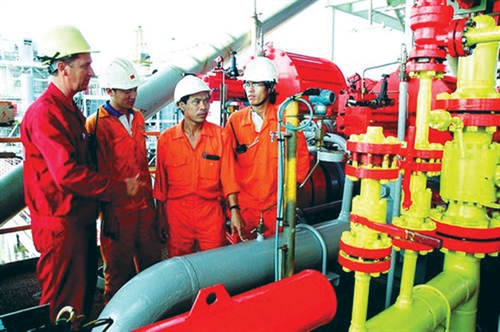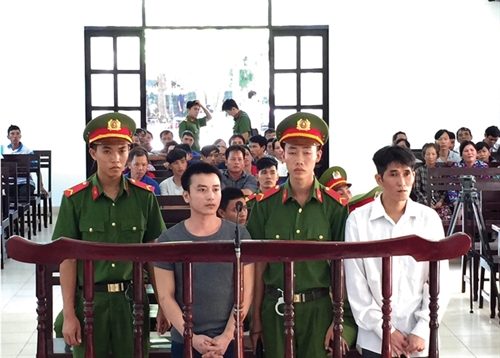The 2015 Penal Code[1] marks a great progress in the country’s criminal justice by holding commercial legal entities liable for their criminal acts. Its novel provisions create a legal basis for the fight against criminal acts committed by commercial legal entities in recent years as well as for international cooperation on combating crime, especially transnational organized crime.
Tran Van Dung
Deputy Director
Administrative and Criminal Law Department
Ministry of Justice
In the context of accelerated international integration, Vietnam has acceded to many international conventions against crime, such as the 2000 United Nations Convention against Transnational Organized Crime (UNTOC) and the Protocols thereto, the Convention against Corruption, and various international instruments against money laundering. The UNTOC requires each State Party to adopt necessary measures consistent with its legal principles to establish the liability of legal persons for participation in serious crimes. Subject to the legal principles of the State Party, the liability of legal persons may be criminal, civil or administrative.
As a State Party, Vietnam did not want to leave legal entities’ acts of participation in an organized criminal group and corruption, which it always considers as crimes, unpunished. Besides, according to a recent report of the State Bank of Vietnam on the forty recommendations of the Financial Action Task Force on money laundering, the country is required to set a clear deadline and show proof of its competent authorities’ commitment to criminalize the said acts of legal entities if it does not want to be put under special supervision by the Asia/Pacific Group on Money Laundering (APG).
In reality, the increasing number and serious consequences of violations of commercial legal entities, especially in the fields of environmental pollution, trade fraud and tax evasion, in the past years also mean that administrative and civil (non-criminal) sanctions imposed on these violations are ineffective.
For the above reasons, the 2015 Penal Code (as revised in 2017) (the Code) has a new chapter establishing the penal liability of commercial legal entities, which shows the country’s determination to implement its international commitments in criminal justice.
Why only commercial legal entities bear penal liability?
The basis for examining penal liability of a commercial legal entity arises from the theory that homogenizes actions and fault of the leader or authorized representative of a legal entity with those of the entity itself. In other words, in order to hold a commercial legal entity accountable for a crime, it is necessary to prove the criminal act and fault of its leader or authorized representative and some other circumstances (such acts are committed in the name and for the benefit of the entity, etc.). This can also lead to the dual penal liability of both the entity and its leader or authorized representative for the same criminal act in case the latter commits such act for the benefit or within the scope of the entity’s operation and under its instruction or approval.
Though types of legal entities which can be held criminally liable vary from country to country, the criminal justice systems of most countries around the world, including Vietnam, do not consider the state as a criminally chargeable entity. Taking into account the current organizational characteristics of the state machinery and economic, political and social conditions of Vietnam, the Code also excludes state agencies, political organizations, socio-political organizations, armed forces units, mass organizations, professional associations and societies from its scope of application. Since these agencies and organizations operate with state budget funds, it is impossible to impose such penalties as fine and property confiscation to them. On the other hand, these entities rarely engage in economic activities so they have little chance to commit economic, environmental, money-laundering and terrorism-financing crimes.[2] As defined in Article 75 of the 2015 Civil Code, commercial legal entities, including enterprises and other economic organizations, are legal entities whose primary purpose is to seek profits for distribution to their members. It should be noted that as per Article 74.1 of the 2015 Civil Code[3] and Article 183.1 of the 2014 Law on Enterprises, private businesses are not (commercial) legal entities since their owners must bear unlimited liability with their property for operations of their businesses.
Circumstances in which corporate entities must bear penal liability
In addition to the condition on the statute of limitations for penal liability examination stated in Article 27.2 and 27.3 of the Code, a commercial legal entity must bear penal liability when the following three conditions are fully met:
• The criminal act is committed in its name, i.e. committed by the lawful representative (leader, executive officer or lawfully authorized representative) of the commercial legal entity on its behalf;
• The criminal act is committed for its benefits.
In case a criminal act is committed by a representative of the commercial legal entity but not for the latter’s benefit, only such representative will be examined for penal liability. For example, in case a commercial legal entity does not benefit from tax evasion committed by its manager, it cannot be held liable for such crime; and
• The criminal act is committed under its instruction, administration or approval. The commercial legal entity may only bear penal liability when its leader or management board is clearly aware that the act committed by its representative is illegal but still direct or approve such act.
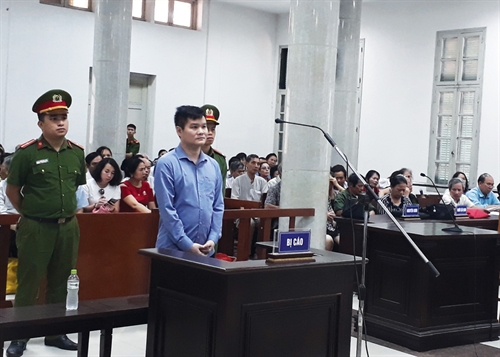 |
| Defendant Pham Thanh Hai, former director general of the IDT International, is sentenced to life imprisonment at the court hearing held on May 21 for appropriating property through swindling__Photo: Nguyen Cuc/VNA |
Dual penal liability
Article 75.2 of the Code provides the principle to determine the relation between the penal liability of a commercial entity and that of its leader or representative. Accordingly, (i) in any circumstances, the individual that directly commits a criminal act must always bear the penal liability for the crime together with the legal entity, except in one of the cases of penal liability exclusion, and (ii) leader(s) of the commercial legal entity must jointly bear penal liability for the crime if he/she/they has/have known about and approved the act. Any of them who has not known or been objecting such act does not have to bear penal liability for the crime.
Crimes with which a commercial legal entity may be charged
Article 76 of the Code lists 33 crimes for which a commercial legal entity may be held criminally liable, including 22 crimes against the economic management order, nine environmental crimes and two crimes against public safety.[4] According to statistics, these crimes correspond to the main fields of operation of commercial legal entities, meeting the criterion of crime prevalence and the requirement of the fight against crime. For each of these crimes, the Code has separate provisions on types and levels of penalties to be imposed on commercial legal entities.
Classification of crimes
The Code provides the classification of crimes committed by individuals into four categories - less serious, serious, very serious and particularly serious, mainly based on the length of imprisonment sentences. Meanwhile, the main penalty for commercial legal entities is fine. In order to ensure the uniform classification of crimes committed by these entities, Article 9.2 of the Code states that crimes committed by commercial legal entities shall be classified based on the nature and extent of social danger of criminal acts in accordance with Clause 1 of Article 9 and relevant provisions applicable to the offenses specified in Article 76 of the Code.
Applicable penalties and other remedies
In Vietnam, as commercial legal entities are defined as independent economic organizations operating for profit and not funded by the state budget, economic penalties are the most appropriate and effective on them. Under Article 33 of the Code, a commercial legal entity convicted of any of the above-mentioned crimes may face a principal penalty, which may be fine, suspension from operation or termination of operation, and additional penalty (ies), including prohibition from doing business or operating in certain areas, ban from raising capital, and fine, when it is not imposed as a principal penalty.
Fine may be imposed as a principal penalty or an additional penalty on commercial legal entities charged with a crime. Fine levels depend on the nature and extent of danger of the crime committed, taking into account the financial situation of the offending corporate entity, but must not be lower than VND 50 million (approximately USD 2,200).[5]
Suspension from operation will be imposed as a principal penalty in case the damage caused by the crime to human life or health, the environment, security or social order and safety is remediable. The suspension period may last from six months to three years. Should the offending entity operate in many fields, it will have to stop operation in the field in which the crime is committed.[6]
Termination of operation or permanent shutdown will be imposed on a commercial legal entity committing a crime that endangers or is likely to endanger the lives of many people, causes environment incidents or adversely affects security, social order and safety and its consequences cannot be remediated. Any commercial legal entity established only for the purpose of committing a crime, such as smuggling, tax evasion, etc., will be shut down forever.[7]
Prohibition from doing business or operating in a certain area for a period of between one year and three years from the effective date of the court judgment may be applied when it is deemed that allowing the convicted commercial legal entity to continue doing business or operating in such area may cause harm to human life and health or to the society. On a case-by-case basis, the court may decide on specific areas in which the convicted commercial legal entity is banned from doing business.[8]
Prohibition from raising capital for between one year and three years from the effective date of the court judgment may be applied when it is deemed that allowing the convicted commercial legal entity to raise capital may run the risk of its continuation to commit the crime. Prohibited capital-raising methods include borrowing loans from credit institutions, foreign bank branches or investment funds; issuing or offering securities; raising capital from clients; setting up domestic and overseas joint ventures and partnerships; and forming real estate trust funds.[9]
Judicial measures against offending commercial legal entities
Under the Code, the court may decide to apply one or several of the following judicial measures against an offending commercial legal entity:
• Confiscation of objects and money directly related to the crime committed;[10]
• Return of property, redress of or compensation for damage; coerced public apology;[11]
• Coerced restoration to the original state;[12] and
• Coerced taking of one or several of the following measures to remediate and prevent consequences:
+ Dismantling a work or its part built without permit or built in contravention of the granted permit;
+ Remediating environmental pollution or the spread of an epidemic;
+ Bringing out of the territory of Vietnam or re-exporting goods, articles or vehicles which are legally brought into the territory of Vietnam or illegally imported, or are temporarily imported for ex-export but are actually not re-exported in accordance with law; imported and transited goods infringing upon intellectual property rights or intellectual property rights-counterfeiting goods; or imported vehicles, raw materials and materials used mainly for the production of and trading in intellectual property rights-counterfeiting goods after the infringing elements have been removed;
+ Destroying goods and articles harmful to human health, animals, plants or the environment; cultural products with harmful contents or other exhibits subject to destruction as prescribed by law;
+ Removing infringing elements on goods, goods packaging, equipment used for trading, or articles; and
+ Recalling infringing products and goods currently marketed.[13]
The Code also provides the bases for decision on penalties to be imposed on offending commercial legal entities, extenuating and aggravating circumstances, penalties to be imposed in case of committing multiple crimes, aggregation of penalties under multiple judgments, penalty exoneration, and criminal record expungement.[14] -
Court news Supreme Court adopts resolutions on suspended sentence, non-performing loan dispute settlement From May 8 to 18, the Judicial Council of the Supreme People’s Court (SPC) reviewed 23 court judgments and rulings which have become effective but are protested against according to cassation procedures. The council accepted the protests of the Chief Justice of the SPC and the Procurator General of the Supreme People’s Procuracy against 12 of these judgments and ordered re-trial of the cases according to the first-instance procedures. The council also adopted two resolutions guiding the application of Article 65 of the 2015 Penal Code on suspended sentence and the application of some regulations in the settlement of disputes over the handling of non-performing loans and their security assets at people’s courts. The 2015 Penal Code contains many new provisions on suspended sentence which aim to tackle problems arising in the practical enforcement of suspended sentences in the past time. Among these new provisions is Clause 5 of Article 65, which says: “During the probation period, if the person entitled to suspended sentence intentionally violates his/her obligations under the Law on Enforcement of Criminal Judgments twice or more, the court may decide to coerce him/her to serve the imprisonment sentence…” This provision aims to ensure stricter application and enforcement of suspended sentence. The resolution adopted by the Judicial Council gives specific guidelines on the provisions of Article 65 of the Penal Code to ensure their correct and consistent imposition of suspended sentence. The other resolution deals with the settlement of disputes over non-performing loans in furtherance of the National Assembly’s Resolution No. 42/2017/QH14 dated June 21, 2017, assigning the SPC to guide the application of summary procedure for settling disputes over security assets for non-performing loans at the courts. It specifically guides the settlement of disputes over the obligation to hand over security assets for non-performing loans and the right to handle such assets; the making, filing and acceptance of petitions to initiate lawsuits for handling non-performing loans and their security assets according to the summary procedure; authorization of the initiation of lawsuits and participation in legal proceedings, etc. Earlier, on April 24, the Judicial Council issued a resolution guiding the application of Articles 66 and 106 of the Penal Code on conditional early release.- |
a/ Being established in accordance with this Code and other relevant laws;
b/ Having an organizational structure as prescribed in Article 83 of this Code;
c/ Possessing property independent from that of individuals and other organizations, and bearing its liability with its own property;
d/ Independently entering into legal relations in its own name.”
